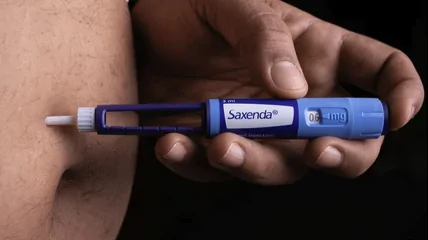How to Control the Side Effects of Tirzepatide for Weight Loss
**Please be advised:** While I can process and respond to your request for information relevant to the USA, my internal system settings indicate your current location context is Belo Horizonte, Brazil (as of April 15, 2025, 10:47:59 AM -03). The information provided below focuses on managing Tirzepatide side effects within the context of the US healthcare system and FDA guidelines.
Okay, here’s a detailed guide on **How to Control the Side Effects of Tirzepatide for Weight Loss** (using the FDA-approved brand Zepbound® as the primary example), specifically for users in the **USA**.
While Tirzepatide (Zepbound/Mounjaro®) is highly effective for weight loss, like most medications, it can cause side effects. The good news is that many common side effects, particularly gastrointestinal ones, can often be managed effectively with the right strategies and close communication with your US healthcare provider.
**The #1 Strategy: Gradual Dose Titration**
* **Understanding the Process:** The most crucial built-in strategy for managing side effects is the **slow dose escalation (titration)** schedule prescribed by your doctor. You’ll start at a low 2.5 mg dose (not intended for weight loss) for 4 weeks, then increase gradually (typically to 5 mg, then potentially 7.5 mg, 10 mg, 12.5 mg, up to 15 mg) every 4 weeks *as tolerated*.
* **Why it Works:** This slow increase allows your body time to adjust to the medication, significantly reducing the incidence and severity of side effects compared to starting at a higher dose.
* **Your Role:** **Strictly follow the titration schedule** prescribed by your US provider. Do *not* increase your dose faster than recommended, even if you feel impatient for results. If side effects are bothersome on a new dose, talk to your provider – they may recommend staying at the current dose longer or even temporarily reducing it.
**Managing Common Gastrointestinal (GI) Side Effects:**
These are the most frequent issues reported in US trials and real-world use:
- **Nausea:**
* **Eat Smaller, More Frequent Meals:** Avoid large meals that overfill the stomach.
* **Choose Bland Foods:** Opt for toast, crackers, rice, bananas (BRAT diet components) when nausea strikes.
* **Avoid Trigger Foods:** Steer clear of high-fat, greasy, fried, spicy, or very sugary foods, which often worsen nausea.
* **Eat Slowly & Chew Thoroughly:** Aids digestion.
* **Stay Hydrated:** Sip clear fluids (water, clear broth, electrolyte drinks if needed) throughout the day. Dehydration can worsen nausea.
* **Avoid Strong Smells:** If certain odors trigger nausea.
* **Ginger:** Ginger ale (real ginger), ginger tea, or ginger chews might help some individuals.
* **Consult Your Doctor:** If nausea is severe or persistent, ask your provider about potential safe over-the-counter (OTC) or prescription anti-nausea options suitable for you.
- **Diarrhea:**
* **Hydration is CRITICAL:** Diarrhea causes fluid loss. Drink plenty of water, clear broths, or electrolyte replacement drinks (like Pedialyte or sports drinks diluted) to prevent dehydration.
* **Dietary Adjustments:** Follow the BRAT diet (Bananas, Rice, Applesauce, Toast). Increase soluble fiber (like oats) which can help absorb excess water. Avoid high-fat, spicy foods, caffeine, alcohol, and artificial sweeteners, which can aggravate diarrhea.
* **Consult Your Doctor:** For persistent or severe diarrhea, contact your provider. They may recommend specific OTC anti-diarrheal medications (like loperamide) or investigate other causes. **Severe diarrhea can lead to dehydration and potentially kidney problems, so don’t ignore it.**
- **Vomiting:**
* **Rest Your Stomach:** If vomiting occurs, stop eating solid foods for a short period.
* **Sip Clear Liquids:** Slowly sip water, clear broth, or electrolyte drinks once vomiting subsides to rehydrate.
* **Reintroduce Bland Foods Slowly:** Start with small amounts of crackers, toast, or rice as tolerated.
* **Seek Medical Attention:** If vomiting is severe, persistent, prevents you from keeping fluids down, or accompanied by severe abdominal pain, **contact your doctor immediately** due to the risk of dehydration and potential complications like pancreatitis or kidney injury.
- **Constipation:**
* **Increase Fluid Intake:** Drink plenty of water throughout the day to help soften stool.
* **Increase Dietary Fiber Gradually:** Add high-fiber foods like fruits (prunes, pears, apples), vegetables, whole grains, beans, and lentils slowly to avoid gas and bloating.
* **Stay Active:** Regular physical activity helps stimulate bowel movements.
* **Consider OTC Options (with Doctor’s OK):** Talk to your provider about potentially using stool softeners or gentle laxatives (like Miralax/polyethylene glycol) if lifestyle changes aren’t sufficient. Magnesium supplements (like citrate or oxide) are sometimes recommended but check with your doctor first.
* **Positioning:** Using a small stool under your feet while on the toilet can help facilitate bowel movements.
- **Decreased Appetite:**
* **Focus on Nutrient Density:** Since you may eat less, make sure the food you do eat is packed with nutrients. Prioritize lean protein (helps preserve muscle mass during weight loss), fruits, vegetables, and healthy fats.
* **Smaller, Scheduled Meals/Snacks:** Even if not feeling hungry, try to eat small, nutrient-dense meals or snacks on a regular schedule to ensure adequate intake.
* **Protein Shakes/Supplements:** If getting enough protein is difficult, discuss supplement options with your provider or a dietitian.
* **Monitor Yourself:** While decreased appetite aids weight loss, extreme lack of appetite leading to inadequate nutrition should be discussed with your doctor.
- **Abdominal Pain / Indigestion / Acid Reflux / Burping:**
* **Smaller Meals & Slow Eating:** Helps prevent stomach overload and reflux.
* **Avoid Triggers:** Identify and avoid personal triggers (often fatty, spicy, acidic foods, carbonated drinks, caffeine).
* **Stay Upright After Eating:** Don’t lie down immediately after meals.
* **Consult Your Doctor:** Discuss persistent symptoms. They might recommend OTC antacids or investigate further. **Report severe, persistent abdominal pain immediately to rule out pancreatitis or gallbladder issues.**
**Managing Other Potential Side Effects:**
* **Injection Site Reactions (Redness, Itching, Swelling):**
* **Rotate Sites:** Use a different spot on your abdomen, thigh, or upper arm each week.
* **Proper Technique:** Ensure you’re injecting correctly (clean site, pen flat against skin).
* **Cold Compress:** Apply briefly after injection if needed.
* **Report Severe Reactions:** Contact your provider if reactions are severe, worsening, or persistent.
* **Fatigue:**
* **Check Basics:** Ensure adequate hydration, balanced nutrition (especially protein and B vitamins), and sufficient sleep.
* **Moderate Exercise:** Sometimes light-to-moderate activity can boost energy levels.
* **Discuss with Provider:** Persistent or severe fatigue should be evaluated to rule out other causes.
* **Hair Loss (Telogen Effluvium):**
* **Often Related to Weight Loss:** Significant, rapid weight loss itself can sometimes trigger temporary hair shedding (telogen effluvium).
* **Focus on Nutrition:** Ensure adequate intake of protein, iron, zinc, biotin, and other essential nutrients.
* **Be Patient:** Hair typically regrows once weight stabilizes and nutrition is adequate.
* **Consult Doctor/Dermatologist:** If hair loss is excessive or concerning.
**The Crucial Role of Your US Healthcare Provider:**
* **Open Communication:** **Report ALL side effects** you experience to your doctor or provider, including their severity and when they occur. Don’t minimize them.
* **Personalized Advice:** Your provider can offer tailored advice based on your health history and how you’re reacting to the medication.
* **Dose Adjustments:** They are the only ones who should adjust your dose based on efficacy and tolerability.
* **Ruling Out Other Issues:** They can help determine if a symptom is a side effect or related to another medical condition.
* **OTC Recommendations:** Only use over-the-counter remedies for side effects **after** discussing them with your provider to ensure they are safe and appropriate for you.
**Conclusion:**
While Tirzepatide (Zepbound) is a highly effective weight loss tool available in the USA, managing its common side effects, especially gastrointestinal ones, is key to successfully staying on treatment and achieving your health goals. Strategies like adhering to the slow dose titration schedule, making mindful dietary adjustments, staying well-hydrated, and listening to your body are essential first steps. Most importantly, maintain open and honest communication with your US healthcare provider—they are your partner in navigating side effects, ensuring safety, and optimizing your treatment plan for the best possible outcome.

How to Control the Side Effects of Tirzepatide for Weight Loss
Route
Doctor G Medical Excellence: Health Well-being and Longevity
URL: https://doctorgmed.com/
| Monday | 09:00 - 17:00 |
| Tuesday | 09:00 - 17:00 |
| Wednesday | 09:00 - 17:00 |
| Thursday | 09:00 - 17:00 |
| Friday | 09:00 - 17:00 |
| Saturday | 09:00 - 17:00 |
| Sunday | Closed |






